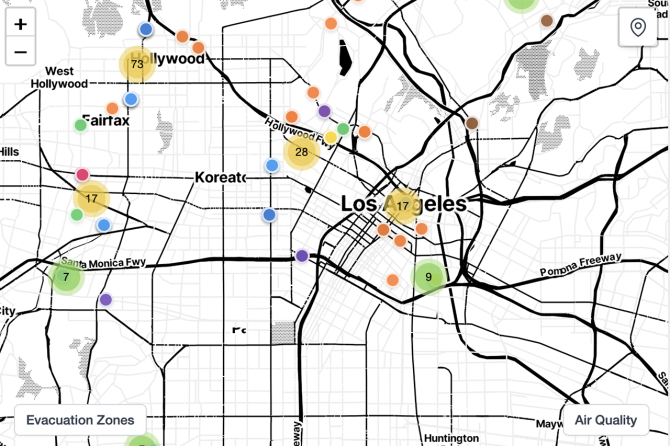Johan Michalove is nearly 3,000 miles from the Los Angeles wildfires, but that didn’t stop him from pitching in.
A doctoral student in the field of information science currently based in New York City, Michalove developed an interactive map at fireaid.info that has become an online hub for thousands of people in the greater Los Angeles area who need provisions, are looking to donate supplies or want to get involved.
 Click to open gallery view
Click to open gallery view
Credit: Louis DiPietro/Provided
“I like to say that I build at the speed of crisis,” said Michalove, who hurriedly developed and launched the map on Jan. 8, just as wildfires around L.A. intensified. “I have been calling my map a ‘cartography of care,’ because it’s not only a visualization of aid and resources, but it’s a visualization of the collective goodwill of people on the ground and in the community. It’s vastly underestimated just how much people want to help their neighbors and help their community.”
Fireaid.info – which to date has attracted 280,000 views – automatically pulls information from a collaborative Google spreadsheet that serves as a kind of community message board connecting L.A. neighbors in need with free resources and services.
Information on the spreadsheet is vetted and managed by Mutual Aid LA Network – MALAN – and shares where people can find free food, clothes, phone-charging stations and even childcare among the dozens of aid locations across the greater LA area. Volunteers can also learn which locations need which items.
“People really love it,” Michalove said. “All the feedback that I’ve had has been overwhelmingly positive.”
“Was able to find friends and neighbors!” wrote one resident about the map. “They helped make a hygiene kit for a 64-year-old friend whose home burned down.”
“This website helped my organization find a place to drop off donations that we collected,” wrote another.
“I think Johan’s work is a quintessentially info sci kind of contribution – thinking deeply about a problem in its social and, indeed, planetary dimensions, then working creatively to a response that strengthens the capacity and fabric of local communities and actors,” said Steven Jackson, vice provost for academic innovation and professor in the Department of Information Science in the Cornell Ann S. Bowers College of Computing and Information Science, and in the Department of Science and Technology Studies in the College of Arts and Sciences.
Jackson and Malte Jung, associate professor of information science in Cornell Bowers CIS and the Nancy H. ’62 and Philip M. ’62 Young Sesquicentennial Faculty Fellow, are Michalove’s co-advisers.
A technologist and systems designer, Michalove created the map after seeing social media posts about the wildfires, which sparked memories of his time in Australia during the catastrophic brush fires of 2019 and ’20, known as the “Black Summer.” He came across MALAN’s spreadsheet and was floored: Here was grassroots organizing happening online, in real-time, and in response to catastrophe. He immediately went to work making MALAN’s information more interactive and mobile-friendly.
“Trying to use a spreadsheet on your phone is miserable. Now, imagine how miserable you’d be if you just lost your house, all you had was your phone, and you’re trying to get access to free resources,” he said. “So I said, ‘I can build an interface layer and just pull data from the spreadsheet and put it in a map.’”
Since launching fireaid.info, Michalove has made a few tweaks based on user feedback. Most notably, the map can be translated into 17 different languages.
As for future use, he said the technology behind interactive maps like fireaid.info can be used “anywhere people want to help each other.”
“And that’s everywhere,” he said. “People always want to volunteer. They want to donate time. They want to donate whatever excess resources they have. It’s really an information science problem in a lot of ways – to allocate resources efficiently.”
The experience led him to establish mutua, a nonprofit that develops technologies in collaboration with community organizers to build digital infrastructure for mutual aid networks.
“Unfortunately we’ll see more and more of the kinds of problems Johan is targeting in the years ahead,” said Jackson, who directs Cornell’s Computing on Earth lab, where Michalove is a member. “As the work of the Computing On Earth Lab suggests, the ability to think and work creatively from and with communities will be essential to our ability to survive and thrive on a changing planet.”